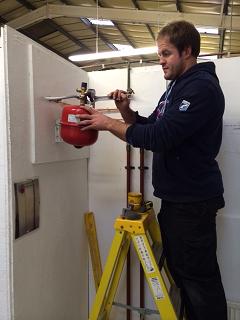Having fully completed his professional electrician course, ex-rugby player and Access Academies student Xavier Rush has now turned his attention towards retraining in a second trade and begun a plumbing training course with us. We caught up with him during the fourth week of his six week course to find out how he's getting on and how the plumbing training has differed from his previous experience with the electrical training course. One thing's for sure, it's a very different experience to playing rugby for both the All Blacks and Cardiff Blues...
 How are you finding the change from electrical work to a plumbing course?
How are you finding the change from electrical work to a plumbing course?
It’s definitely the most practical I’ve done so far! There was a lot of theory with the electric but theory there is here is probably a lot easier to grasp. But then it’s also far more hands on too. It’s very busy – we’ve been working with low carbon steel and a lot of copper as well. I fitted a bathroom last week which was enjoyable – it’s nice to step back and see the results sometimes.
But a lot like the electric these are intense course and you pick up a lot of information and skills quickly. It helps that you’re learning from people who’ve been in the industry a long time.
Had you done any plumbing before starting the course?
No, before this I didn’t have a thing – I couldn’t even stop a leak. You’ve got to pick it up quite quickly as there’s no one there holding your hand. Once you’ve got an understanding of it all it gets a lot easier. It’s just knowing what fittings do what and what products you’re working with, that sort of thing.
Have you found anything especially difficult over the last four weeks?
I suppose it just takes you a while before you get competent with everything really. Nothing is truly mind boggling. There were a few issues fitting a bath, but it’s the kind of stuff you can get your head around.
How have the tutors been?
They’ve been great and a really big help this week especially. They don’t baby you at all, but make sure to tell you exactly where you’ve gone wrong – which is exactly what they need to do. If you were working in someone’s house and you spring a leak and their lounge ceiling falls in you’re going to be in trouble. So you’ve just got to know. It’s just like anything – the more you practice you have, the better you get. Its good being here because if you’re going to make mistakes make them here, that way I can waste your copper rather than mine!
How have you found the studying at home element of the course?
Like I said, you are picking up a lot of information in a short time so while you’re here you’ve really got to apply yourself for the six weeks. There’s a lot of going home, revising, getting ready for exams because if you don’t do the homework you don’t get the passes. You have got to read the book and retain that information. I’ve had many a late night drinking coffees at Starbucks looking like a bit of a geek.
And finally, how much time do you have left here before you’re all done?
I’ve got two more weeks after Christmas. It’s been an intense four weeks so it’ll be nice to have a bit of a break and then come back and hit it again. Because we’ve done so much over the last few weeks and put so many fittings together you should be able to retain a lot of the information. And then after that that’ll be it for me…for now! I might come back and do the one week electrical testing course just to freshen up on that. But it’s just brilliant to come here and reskill so quickly as an older person. I did carpentry when I left school but to think now I’ve got plumbing and electric qualifications backing that up. And to feel confident with that within ten weeks is berserk really – they’re skills you’ve obviously got for life.
I can look at stuff in houses now and understand it. Obviously it doesn’t give you all the experience – you’re still going to go out there and make mistakes but it’s given me a really good grasp of both industries, both the electric and the plumbing.
As Xavier approaches the end of his Access Academies training, we'll be talking to him again in the new year to discuss his overall experiences and his plans for the future. In the meantime if you have any questions you'd like to ask him about changing careers and retraining in a new trade, please let us know over on Twitter or Facebook. If you yourself would like more information on Access' extensive range of trades training courses (also including gas engineering, carpentry, bricklaying, plastering, tiling and painting/decorating), please get in contact with one of our course advisers on 0800 345 7492.